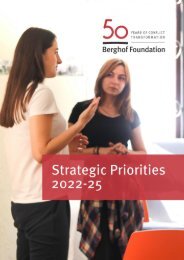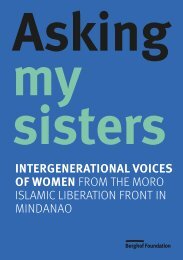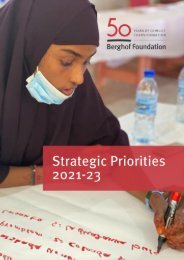Berghof Foundation: 50 years of conflict transformation
This book provides an overview of the Berghof Foundation’s work and impact over the past 50 years and sheds light on the challenges ahead of peacebuilding.
This book provides an overview of the Berghof Foundation’s work and impact over the past 50 years and sheds light on the challenges ahead of peacebuilding.
You also want an ePaper? Increase the reach of your titles
YUMPU automatically turns print PDFs into web optimized ePapers that Google loves.
Digital pathways for peace<br />
Digital tools and in particular<br />
social media will make it<br />
possible to create wider<br />
inclusivity and integrate a<br />
broad variety <strong>of</strong> perspectives,<br />
interests, and needs into a<br />
negotiation process.<br />
Twitter, Instagram and other social media<br />
channels are important tools for activists to raise<br />
awareness <strong>of</strong> human rights violations and social<br />
injustices. When in 2020 the footage capturing the<br />
murder <strong>of</strong> George Floyd spread via social media,<br />
activists quickly joined calls for demonstrations<br />
that revived the #BlackLivesMatter movement<br />
at unprecedented scale and speed. Practically<br />
all protest movements in recent <strong>years</strong> have been<br />
fuelled and transformed through the use <strong>of</strong> social<br />
media; notable examples are the Gezi park protest<br />
in Turkey, the Arab uprisings, the #EndSARS<br />
protests in Nigeria and the 2019-20 Hong<br />
Kong protests.<br />
However, at the same time, we are<br />
witnessing how digital technologies and artificial<br />
intelligence are fundamentally reshaping the<br />
nature <strong>of</strong> armed <strong>conflict</strong> and present a set <strong>of</strong> new<br />
challenges to human rights: fully autonomous<br />
weapon systems with limited accountability<br />
and proportionality can reduce the possibility<br />
<strong>of</strong> military casualties and lower the threshold <strong>of</strong><br />
war. Authoritarian governments increasingly use<br />
digital surveillance to control and repress restive<br />
populations and inconvenient civil society actors,<br />
while political arsonists exploit social media to fuel<br />
hatred, manipulate public opinion and exacerbate<br />
social polarisation. Democratic governments and<br />
social media platforms are <strong>of</strong>ten ill-prepared to do<br />
much about it.<br />
As peacebuilders, we cannot afford<br />
to disregard ongoing developments in digital<br />
technology and artificial intelligence. We need<br />
to engage with them proactively, ethically and<br />
transparently while constantly reflecting on<br />
possible negative consequences. If we fail<br />
to do so, we leave this field to those who see<br />
new technologies as an opportunity to control,<br />
manipulate and repress populations, to gain<br />
political influence, and to conduct warfare by<br />
ever more heinous means.<br />
At <strong>Bergh<strong>of</strong></strong>, we have been combining<br />
peacebuilding and digitalisation for a number <strong>of</strong><br />
<strong>years</strong> in Germany. Our digital peace education<br />
projects www.friedenfragen.de, Streitkultur 2.0<br />
and #vrschwrng, which are presented in detail in<br />
this publication (see page 106), have spearheaded<br />
our exploration <strong>of</strong> digital peacebuilding. Recently,<br />
we have expanded our engagement in this field to<br />
other contexts. In Lebanon, we are supporting an<br />
inclusive group <strong>of</strong> social media influencers from<br />
various communities and confessional groups in<br />
their efforts to de-escalate tensions, advocate<br />
for inclusive citizenship concepts and uphold a<br />
constructive forward-looking dialogue on key<br />
national priorities.<br />
When violence erupted in Lebanon in<br />
2019 and 2020 and polarised messages went<br />
viral on social media, this group <strong>of</strong> influencers<br />
was able to use its prominent status and wide<br />
reach to confront sectarian messaging and incite<br />
narratives with alternative messages that promote<br />
non-exclusionary identity concepts and shared<br />
values <strong>of</strong> citizenship and empathy. Based on<br />
these promising experiences, we intend to further<br />
develop and deepen our engagement with digital<br />
<strong>conflict</strong> <strong>transformation</strong> both geographically<br />
and thematically.<br />
There is growing consensus that<br />
digital technologies are key tools to prevent,<br />
resolve, transform and manage <strong>conflict</strong>s. Digital<br />
technologies can help us improve our <strong>conflict</strong><br />
analysis by increasing the volume and variety <strong>of</strong><br />
information that can be gathered at low cost and<br />
in real time, and provide innovative means for<br />
managing and visualising that information. With<br />
the help <strong>of</strong> digital technologies, we will also be able<br />
to better facilitate and sustain engagement with<br />
<strong>conflict</strong> parties and improve our understanding<br />
<strong>of</strong> their positions and relations. While digital<br />
technologies will never be able to completely<br />
replace the sensitive, human-to-human interaction<br />
<strong>of</strong> high-level mediation that is contingent on the<br />
mediator’s need to gain the trust <strong>of</strong> the <strong>conflict</strong><br />
parties, they will nonetheless allow us to adapt the<br />
mediation strategy and the design <strong>of</strong> the peace<br />
process c<br />
ontinuously to ongoing developments and needs.<br />
Digital tools and in particular social media<br />
will make it possible to create wider inclusivity<br />
and integrate a broad variety <strong>of</strong> perspectives,<br />
interests and needs into a negotiation process.<br />
They enable peacebuilders to assess the views<br />
and opinions <strong>of</strong> the wider population, and inform<br />
and educate the public and organised actors<br />
about the negotiations, the agreement and its<br />
implementation. This will ultimately increase the<br />
legitimacy and ownership <strong>of</strong> the peace process.<br />
114<br />
115










